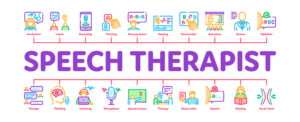Speech therapy can be highly rewarding, with diverse strategies that can help children, adults, and seniors improve communication skills. Whether you’re a caregiver, parent, or therapist, incorporating new techniques can make a significant difference. Here are 35 powerful and creative strategies for speech therapy that cater to various needs and age groups.

Incorporate Visual Aids
Visual aids like pictures and flashcards can help reinforce vocabulary and concepts, especially for younger children or visual learners.
Use Technology and Apps
Apps designed for speech therapy can provide interactive exercises and practice in a fun, engaging way.
Practice Repetition
Repeating words or sounds can help build confidence and reinforce speech patterns. Daily practice routines are effective for all age groups.
Engage in Storytelling
Storytelling encourages narrative skills, helps with sequence recall, and promotes expressive language.
Try Articulation Games
Games focusing on articulation allow individuals to work on specific sounds in a structured yet playful setting.
Use Puppets and Role-Playing
For children, puppets can make therapy sessions fun and interactive, improving confidence and expression.
Encourage Conversation Starters
Promote open dialogue with conversation starters, which can build vocabulary and social interaction skills.
Focus on Mouth and Tongue Exercises
Simple exercises that involve tongue and lip movements can improve pronunciation and articulation.
Teach Phonemic Awareness
Phonemic awareness activities like rhyming and sound blending help with pronunciation and reading readiness.
Encourage Reading Out Loud
Reading aloud enhances fluency, expression, and vocabulary. For adults, try reading news articles or short stories.
Use Reward Systems
Positive reinforcement with stickers, points, or small rewards can be motivating, especially for young children.
Practice Descriptive Language
Use sensory activities to describe objects, helping individuals expand their vocabulary and practice expressive language.
Break Down Sounds (Isolation Technique)
Focus on individual sounds before blending them into words, making it easier to master complex words.
Leverage Everyday Routines
Turn daily routines like cooking or cleaning into learning opportunities by describing steps and actions.
Use Video Modeling
Watching videos of speech exercises or even themselves speaking can give individuals a better understanding of correct pronunciation.
Incorporate Sign Language
Sign language can be a supportive tool in speech therapy, helping with word association and comprehension.
Use Rhyming and Singing
Rhymes and songs make learning new sounds fun and can improve memory retention.
Practice Self-Monitoring Techniques
Teach clients to identify and correct their errors, which encourages independence and self-awareness.
Provide Structured Playtime
Structured play sessions focused on language use are excellent for younger children, promoting social skills and vocabulary.
Use Flashcards for Vocabulary Building
Flashcards are great for repetition and quick vocabulary practice, especially when used in a game format.
Practice Mindfulness Breathing Techniques
For clients who stutter or experience speech anxiety, mindfulness and breathing exercises can help with relaxation.
Encourage Question-and-Answer Activities
Asking questions encourages verbal expression and helps with sentence formation and vocabulary.
Employ Role Models or Peers
Observing and interacting with peers or role models in a group setting can motivate individuals to improve.
Implement Gesture and Body Language Practice
Body language practice helps build confidence in communication and aids those with expressive language disorders.
Focus on Slow Speech Patterns
Encourage clients to slow down, which improves clarity and helps with enunciation.
Create a Word Journal
Keeping a journal of new words allows clients to track their progress and provides a structured way to practice.
Use Everyday Scenarios for Practice
Simulate real-life scenarios like ordering food or making a phone call, which is especially helpful for adults.
Encourage Auditory Memory Exercises
Exercises that involve repeating sentences or instructions improve listening and memory skills.
Practice Vocabulary in Context
Instead of random words, teach vocabulary in the context of daily activities, like naming groceries or clothes.
Play Memory Matching Games
Memory games help with recall, focus, and improve vocabulary retention in a fun way.
Use Picture Story Cards
Picture cards with simple stories encourage sequence learning and narrative skills, essential for language development.
Establish Eye Contact Practices
Practicing eye contact builds social skills and helps clients gain confidence during interactions.
Integrate Writing Activities
Writing sentences or journal entries reinforces vocabulary and sentence structure, complementing verbal practice.
Engage in Repetition with Variation
Vary the words or sentences in repetitive practice, which makes it less monotonous and more engaging.
Provide Positive Reinforcement and Feedback
Consistent encouragement and constructive feedback help build confidence and motivation in clients of all ages.



Write a comment
Your email address will not be published. All fields are required